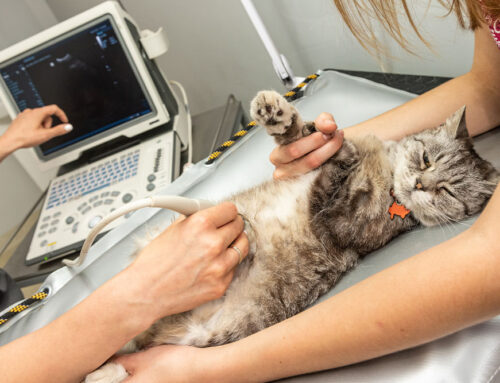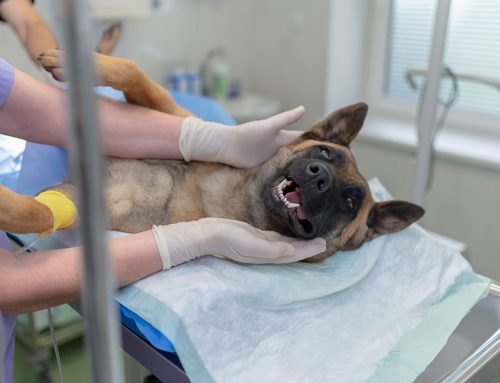Heartworm disease strikes fear in the heart of every pet owner—and rightly so. This potentially life-threatening parasitic infection can be transmitted to pets with a single mosquito bite, yet infected pets often show no signs until their condition is critical. Worse, heartworm-positive cats may show no signs at all.
Fortunately, you can easily outsmart this dangerous threat, although dedication and consistency is required for effective prevention. Protect your pet from heartworm disease with this six-step guide from Burlington Veterinary Center.
#1: Talk to your veterinarian about heartworm prevention
Heartworm disease is transmitted by infected mosquitoes—those inescapable bloodsucking insects that ruin your summer cookouts. And, because eliminating mosquitoes is impossible, heartworm preventives are the only sure way to protect your pet against deadly infection.
Unfortunately, “preventive” is a bit of a misnomer. These medications work retroactively, which means they work after the infected mosquito has bitten your pet. When the mosquito bites, they transmit immature heartworms (i.e., microfilariae) that preventives eliminate before they mature into dangerous adults. For this reason, you must ensure your pet receives each dose on time to avoid dangerous coverage gaps.
Heartworm preventives are safe, effective, and available only through a licensed veterinarian. If your pet isn’t currently on a heartworm prevention regimen, schedule an appointment at Burlington Veterinary Center to discuss your pet’s options.
#2: Administer your pet’s heartworm prevention year-round
Mosquitoes may dominate the warmer months, but they do not go away on mild fall and winter days. And, if that isn’t enough, mosquitoes can also slip inside your home and overwinter in your garage or basement, so they are a year-round hazard for unprotected indoor-only pets, as well.
Outsmart the ubiquitous mosquito by administering your pet’s heartworm prevention year-round. This includes monthly oral or topical treatments and bi-annual or annual injectable medications. In addition, most heartworm preventives not only protect your pet and give you peace of mind, but also contain a broad spectrum dewormer that protects your pet against infectious gastrointestinal parasites.
If you need help remembering to dose your pet’s preventives, effective strategies include:
- Setting a recurring phone reminder
- Using a medication reminder app
- Joining a manufacturer’s email reminder list
- Scheduling an single-dose automatic delivery through our online pharmacy
#3: Have your dog tested annually for heartworm disease
Heartworm disease screening tests are recommended every 12 months as part of your dog’s yearly wellness visit. Although testing a pet who is on year-round prevention may seem redundant, testing your pet’s blood ensures the preventive’s efficacy and can reveal hidden disease in the event of a forgotten, misapplied, or vomited dose.
Many heartworm tests also screen for the most prevalent tick-borne diseases, including Lyme disease, ehrlichiosis, and anaplasmosis, which can cause debilitating illness in affected dogs. By identifying early exposure, dogs can receive rapid and effective treatment.
#4: Learn how to recognize early heartworm disease signs in pets
Although the Burlington Veterinary Center team hopes you’ll never need this information, knowing how to recognize early heartworm disease warning signs could save the life of your pet, or another pet, if a diagnosis or preventive dose is missed.
Common heartworm signs in dogs include:
- Persistent cough
- Exercise intolerance
- Weakness or fatigue after brief physical activity
- Vomiting
- Pot-bellied appearance
- Collapse
Because cats are atypical (i.e., non-traditional) heartworm hosts, their clinical signs are vague and sometimes nonexistent. Visible signs may include:
- Asthma-like attacks
- Periodic vomiting
- Appetite loss
- Reduced appetite
- Loss of coordination
- Fainting or seizures
- Sudden death
Sadly, for many cats, unexplained death is the only sign. And, because no safe treatment for feline heartworms exists, prevention is the only option for protecting cats against heartworm disease.
#5: Reduce regional risks by educating other pet owners
According to the American Heartworm Society, one heartworm-positive pet in your neighborhood substantially increases your pet’s infection risk. The only thing that can effectively stop a mosquito from transmitting infective larvae from the heartworm-positive pet to yours is education. Ask your neighbors if their pets, including those who live indoors, are on heartworm preventives and tested annually. Explain disease transmission and risks, and encourage them to schedule an appointment with their veterinarian or Burlington Veterinary Center.
Heartworm prevention takes a village, so be a good neighbor and act locally to reduce disease risks for all pets.
#6: Deter mosquitoes in your pet’s environment and avoid high-risk areas

Environmental management can reduce mosquito populations in your pet’s outdoor environment and, paired with year-round prevention, can create a strong protective barrier against heartworm disease transmission. Discourage mosquitoes from your yard by removing standing water and relocating wildlife feeders. Check your home for potential entry points and seal any cracks, replace damaged window screens, and keep doors and windows closed.
When exercising your dog outdoors, avoid wooded, marshy, and tall grasses where mosquito populations are most concentrated. Apply a pet-safe repellent spray to your dog’s coat to deter mosquitoes from biting.
Heartworm disease is a complex, ruthless, and costly condition, but prevention is simple, safe, and affordable. And, its results are priceless.
To schedule your pet’s annual heartworm preventive care visit or to set up an appointment to discuss a heartworm prevention plan for your pet, contact the Burlington Veterinary Center team.







Leave A Comment